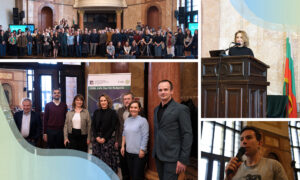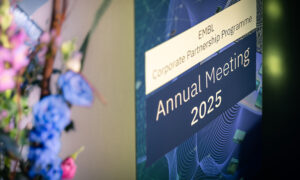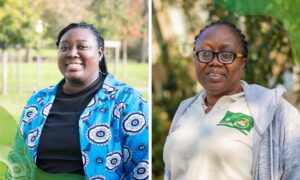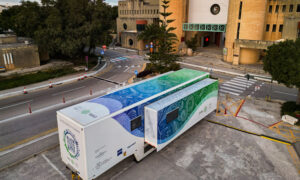
How can we prepare for future pandemics?
EMBL and Portugal gather leading international experts to showcase progress in the fight against COVID-19 and share lessons for the future
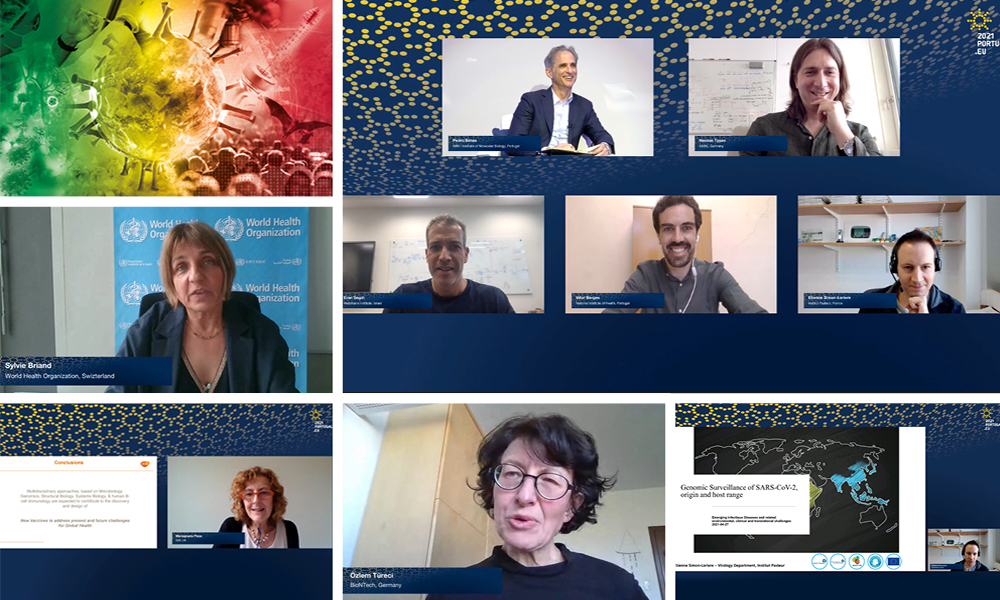
On 27 April, participants from more than 100 countries gathered to discuss key lessons from the COVID-19 pandemic. As part of an enterprise implemented by Portugal during its presidency of the Council of the EU, EMBL and Portugal brought international experts together for a virtual conference. A wide range of topics were covered, including immunology, infectious diseases, and the molecular biology of viruses. The conference provided a valuable opportunity to ensure that important lessons are not lost in the rush towards a world where life is no longer so dominated by COVID-19.
The opening session included a speech by EMBL Director General Edith Heard. She stressed the importance of building links across the scientific community and underlined how fundamental research is the single best way to meet challenges ahead, including future pandemics, the spread of antimicrobial resistance, and the growing incidence of diseases like cancer. Edith also talked about EMBL’s central role in establishing the COVID-19 Data Portal, which has recently marked its first year of operation.
The first scientific session of the conference dealt with the molecular biology of infectious diseases. Nevan Krogan, Director of the Quantitative Biosciences Institute at the University of California San Francisco, commented on how positive it is that the pandemic has shown the speed with which things can move forwards: “What we’ve seen during this pandemic is how fast we can move when we work together, when we break down silos. The challenge will be keeping this spirit in place, so we’re better prepared for the next pandemic.” Nevan also said that the rapid pace of progress around during the pandemic raised questions about why other diseases are not being addressed with similar zeal.
EMBL Group Leader and Senior Scientist Nassos Typas chaired a session on epidemiology. Etienne Simon-Loriere, a group leader at the Institut Pasteur, presented his work on genomic sequencing and surveillance of SARS-CoV-2. He spoke about the deep insights that can be gained from mining what now amounts to more than one million sequenced SARS-CoV-2 genomes. With vaccine rollout now gathering momentum in many parts of the world, Etienne also pointed to the immediate future and the importance of genomic surveillance as the virus continues to circulate and new variants emerge and spread. He explained that such monitoring will also allow us to build a fuller picture of reinfections and so inform decisions on the need for updated vaccines.
A new way of developing vaccines?
The conference also covered vaccine development, in a session that clearly showed the achievements of the biomedical community in recent months. Mariagrazia Pizza, Senior Scientific Director of Bacterial Vaccines at GSK, detailed the development of a Meningococcal B vaccine (4CMenB) – the product of 20 years of sustained effort – to underscore the incredible success and speed that has characterised the development of COVID-19 vaccines.
Özlem Türeci, Co-Founder and Chief Medical Officer at BioNTech, spoke about the work involved in developing a COVID-19 mRNA vaccine, and the lessons that came from a project that moved in just 10 months from a standing start to approval of the vaccine in more than 65 countries. She expressed her hope that the improvised solutions that enabled this success could be formalised, creating a kind of blueprint for vaccine development, as well as addressing the logistical and production issues that have hampered rollout in some areas of the world.
The importance of sustained effort
The conference concluded with a roundtable discussion. Jeremy Farrar, Director of the Wellcome Trust, emphasised the need for sustained long-term support for research. “You can’t just turn on science when you need it. There needs to be continued investment and increased participation of scientists in society and policy,” he said.
Sylvie Briand, Director of Global Infectious Hazard Preparedness at WHO, spoke of the need for far greater operational research on public health interventions. Dominique Costagliola, Deputy Director of Inserm, explained that our response to future pandemics would depend largely on the provision of systematic science funding. Ewan Birney, EMBL Deputy Director General and Director of EMBL’s European Bioinformatics Institute (EMBL-EBI), pointed out that the single greatest lesson from the pandemic “is that ‘the unit’ is the globe. It’s not institutes, it’s not countries, it’s not humans. It is the planet.” As the session closed, Jeremy Farrar expressed his wish that, “we learn the lessons [from the pandemic], and don’t move on too fast and pretend that things have gone better than they actually did.”
Further information about the conference, including recordings of some sessions, can be found via the University of Coimbra website.
